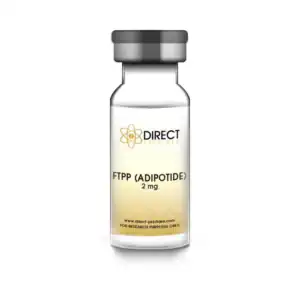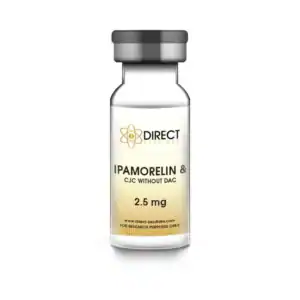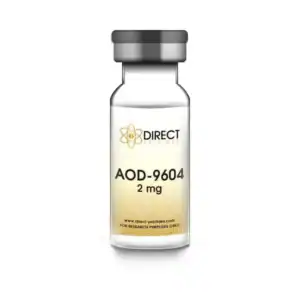In the field of weight loss research, exciting new developments are happening constantly. One of the most interesting discoveries so far is Adipotide, a compound that has gained attention because of its ability to target excess body fat.
Researchers are eager to learn more about how Adipotide works and its potential benefits. However, it is important to understand that Adipotide peptide is still in the research phase and is not approved for human use.
It should only be used in controlled research settings, as its long-term effects and safety are still being studied.
At its core, Adipotide targets a critical factor in fat accumulation: adipose tissue. This tissue, primarily found around the stomach and thighs, serves as the body’s main fat storage.
Through its action, Adipotide works by cutting off the blood supply to fat cells and cancer cells, which leads to their breakdown. This, in turn, can help reduce body mass and promote leaner body composition.
However, Adipotide peptide is not the only compound being studied for its weight loss effects. Researchers have also turned their attention to other peptides and compounds that may help address issues like obesity, metabolic disorders, and fat reduction.
Explore FTPP Peptide with Direct Peptides New Zealand for effective weight loss.
To understand how Adipotide peptide works, we must first explore its effect on fat cells and the blood vessels associated with them. These cells, which make up adipose tissue, play a significant role in energy storage.
By reducing the blood supply to these cells, Adipotide essentially “starves” them of the nutrients they need to survive. As a result, the fat stored in these cells is broken down, leading to reduced body weight.
Importantly, the disruption of fat stores can also improve metabolic functions such as glucose tolerance and insulin sensitivity. These factors are crucial in managing blood sugar levels and preventing metabolic diseases like diabetes.
While Adipotide is making waves in the research community, there are several other peptides and compounds being tested for their effects on weight loss and metabolic health. Let’s look at some of the most notable peptides being researched:
 FTPP peptide works similarly to Adipotide but targets fat cells in a slightly different way. It binds to special receptors on the fat cells and starts a process called apoptosis, or programmed cell death. This process causes fat cells to shrink and break down.
FTPP peptide works similarly to Adipotide but targets fat cells in a slightly different way. It binds to special receptors on the fat cells and starts a process called apoptosis, or programmed cell death. This process causes fat cells to shrink and break down.
As a result, it reduces fat stores in the body, helping with weight loss. By shrinking fat cells, FTPP can help reduce body fat, especially in stubborn areas. While it’s still being studied, FTPP peptide has the potential to play an important role in reducing excess body fat.
 Tesofensine is a peptide that helps control your appetite. It works by regulating hunger hormones in the body.
Tesofensine is a peptide that helps control your appetite. It works by regulating hunger hormones in the body.
When these hormones are controlled, you feel less hungry, which makes it easier to eat fewer calories. Besides controlling hunger, Tesofensine also helps the body break down fat cells.
This makes it a useful tool for weight loss. One of the key benefits of Tesofensine is that it helps reduce weight without losing muscle mass.
Research also shows that Tesofensine can improve glucose tolerance and insulin sensitivity, which are important for keeping your metabolism healthy.
Discover Tesofensine with Direct Peptides New Zealand for appetite control and fat burning.
AOD-9604 is a peptide that works like human growth hormone. It helps burn fat without affecting muscle growth. This peptide targets fat cells directly, helping break them down, especially in hard-to-treat areas like the midsection.
AOD-9604 has shown promise in helping with weight loss while keeping muscles strong.
Unlike other fat loss methods, AOD-9604 doesn’t cause muscle loss. It focuses only on fat tissue, which makes it a safe and effective way to improve body composition.
As studies continue, AOD-9604 could become a great tool for weight loss, particularly for people who want to burn fat but keep muscle.
Check out AOD-9604 with Direct Peptides New Zealand.
 The combination of Ipamorelin and CJC no DAC is a powerful blend of peptides that work together to boost the body’s natural growth hormone.
The combination of Ipamorelin and CJC no DAC is a powerful blend of peptides that work together to boost the body’s natural growth hormone.
Growth hormone is important for many things, like improving metabolism and burning fat. This blend helps the body use stored fat as an energy source, which leads to weight loss.
Additionally, it helps maintain muscle mass while reducing fat. This is especially useful for people who want to lose weight but keep or increase muscle.
By improving metabolism and promoting fat burning, the Ipamorelin & CJC no DAC blend is a promising option for those looking to manage their weight while preserving muscle mass.
Explore Ipamorelin & CJC no DAC Blend with Direct Peptides New Zealand to boost metabolism.
White adipose tissue (WAT) is primarily responsible for storing fat in the body. Although it serves a vital role in energy storage, excessive WAT can lead to obesity and associated health conditions, such as heart disease, diabetes, and cancer.
Research indicates that targeting white fat causes weight loss and reduces the size of adipose cells within the adipose tissue. Adipotide peptide and other research compounds can help to improve body mass index (BMI) and reduce the risk of these serious health issues.
In addition, studies show that reducing adipose tissue can lead to better glucose tolerance, enhancing the body’s ability to process blood sugar and lowering the risk of diabetes.
Explore Peptide Supplies at Direct Peptides New Zealand for all your reconstitution requirements.
There are several potential benefits to using Adipotide in weight loss studies:
Like all research compounds, Adipotide peptide may come with potential side effects. Some of the most common concerns include changes in metabolism, effects on glucose levels, and potential impacts on insulin sensitivity. However, these side effects are still being studied, and more research is needed to fully understand the long-term impact.
In the event of such delays in understanding, including issues related to delayed computer transmissions and customs delays, researchers must continue to examine the conditions of use and ensure that the peptide is safe for experimentation under all applicable law.
Additionally, it is important to maintain a proper backup of data, print a copy of this authorization for future reference. , including the amount of my order. Drug administration protocols, including daily injections of Adipotide, need to be carefully monitored to avoid harmful effects.
Although Adipotide peptide shows promise, more research is needed to understand its full effects. Researchers must test its safety and how it works over a long period. They should also use tools like magnetic resonance imaging (MRI) to track any changes and see how the peptide affects adipose tissue.
Intellectual property concerns must also be considered as scientists explore new compounds. Ensuring that research findings are protected and used responsibly is important as more studies are done.
Adipotide peptide offers a novel approach to rapid weight loss and improvement of insulin resistance along with fat reduction in obese monkeys. While it is still in the experimental stage, its ability to target adipose tissue and reduce food intake and body mass is promising.
Alongside other peptides such as FTPP, Tesofensine, and AOD-9604, Adipotide could play an important role in future treatments for obesity, metabolic disorders, and potentially even prostate cancer.
As always, researchers must proceed with caution. Adipotide and similar peptides are still being studied and are not for human use. Future studies will determine whether these compounds will ultimately offer viable treatments for fat reduction and metabolic health improvement.
When making purchases from Direct Peptides, customers must confirm their acceptance of an order and the acceptance of these terms and conditions of use agreement. These are outlined in the terms and conditions and are in accordance with Nevis law. The agreement covers several important aspects. These include credit terms, the date of my order, and the availability of goods.
Customers must also be aware that all sales are subject to the entire agreement. This agreement governs the editorial control of such content on our website. We do not accept aggregate liability for damages of any kind. This includes issues like computer viruses or problems with downloadable software sites. Additionally, we are not responsible for the content of those sites or the arrangement of such content.
Our website and services cannot be used for commercial purposes without prior consent. We protect intellectual property rights. For customers considering alternative products, we recommend seeking advice of your own advisors. Any applicable transaction will be governed by these terms.
[1] Barnhart KF, Christianson DR, Hanley PW, Driessen WH, Bernacky BJ, Baze WB, Wen S, Tian M, Ma J, Kolonin MG, Saha PK, Do KA, Hulvat JF, Gelovani JG, Chan L, Arap W, Pasqualini R. A peptidomimetic targeting white fat causes weight loss and improved insulin resistance in obese monkeys. Sci Transl Med. 2011 Nov 9;3(108):108ra112.
[2] Escobedo N, Oliver G. The Lymphatic Vasculature: Its Role in Adipose Metabolism and Obesity. Cell Metab. 2017 Oct 3;26(4):598-609.
[3] Dassah M, Deora AB, He K, Hajjar KA. The endothelial cell annexin A2 system and vascular fibrinolysis. Gen Physiol Biophys. 2009;28 Spec No Focus(SPEC):F20-8.
[4] Heffernan M, Summers RJ, Thorburn A, Ogru E, Gianello R, Jiang WJ, Ng FM. The effects of human GH and its lipolytic fragment (AOD9604) on lipid metabolism following chronic treatment in obese mice and beta(3)-AR knock-out mice. Endocrinology. 2001 Dec;142(12):5182-9.
[5] Gilbert JA, Gasteyger C, Raben A, Meier DH, Astrup A, Sjödin A. The effect of tesofensine on appetite sensations. Obesity (Silver Spring). 2012 Mar;20(3):553-61.
[6] Teichman SL, Neale A, Lawrence B, Gagnon C, Castaigne JP, Frohman LA. Prolonged stimulation of growth hormone (GH) and insulin-like growth factor I secretion by CJC-1295, a long-acting analog of GH-releasing hormone, in healthy adults. J Clin Endocrinol Metab. 2006 Mar;91(3):799-805.
Discover the full range of Peptide Vials with 99% purity from Direct Peptides, a trusted global supplier of premium research peptides.

New Reduced Price
New Reduced Price
TWIN PACKS
Ipamorelin CJC Without DAC Blend
£24.75 – £44.55Price range: £24.75 through £44.55 Select options This product has multiple variants. The options may be chosen on the product page
Tesofensine Capsules
£159.66 Select options This product has multiple variants. The options may be chosen on the product page
TWIN PACKS
TWIN PACKS
TWIN PACKS
AOD-9604 Peptide Vial
£18.33 – £218.79Price range: £18.33 through £218.79 Select options This product has multiple variants. The options may be chosen on the product page
FTPP (Adipotide)
£20.17 – £73.15Price range: £20.17 through £73.15 Select options This product has multiple variants. The options may be chosen on the product pageALL CONTENT AND PRODUCT INFORMATION AVAILABLE ON THIS WEBSITE IS FOR EDUCATIONAL PURPOSES ONLY.
DISCLAIMER: These products are intended solely as a research chemical only. This classification allows for their use only for research development and laboratory studies. The information available on our New Zealand Direct Peptides website: https://direct-peptides.com is provided for educational purposes only. These products are not for human or animal use or consumption in any manner. Handling of these products should be limited to suitably qualified professionals. They are not to be classified as a drug, food, cosmetic, or medicinal product and must not be mislabelled or used as such.